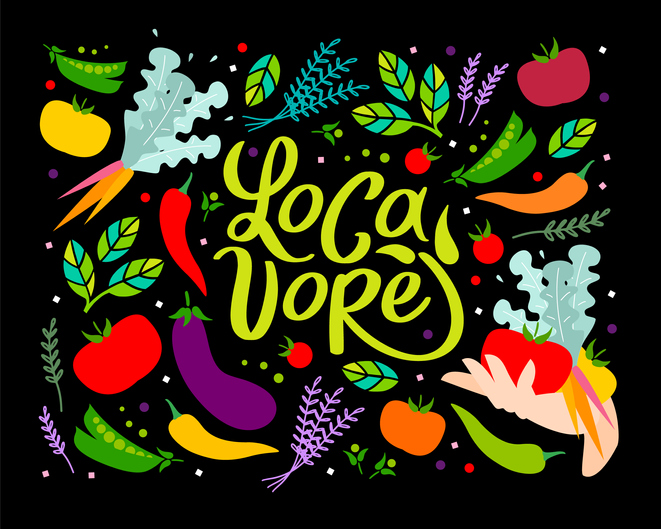You Might Want To Consider Being a ‘Locavore.’

By Sydney Kronfle, pH Labs Researcher & Contributor
I try my best to provide healthy, plant-forward dinners for my husband and 15-month-old son as much as possible. It’s not always easy, and I know many people can relate to this whether they are cooking just for themselves or their families. My biggest struggle is falling into a rut (really, broccoli again?!) or not knowing what to cook for dinner (enter feeling defeated and succumbing to take-out).
Fortunately, I think I finally found a solution that provides more variety, better taste, better nutrition and even less hassle and contemplating. Basically, I let the farmers (or really Mother Nature) decide for me. I now make an effort to eat seasonally as much as possible.
“Seasonal eating is simply eating the food that was recently harvested [so super fresh!] by the farmers. By rotating your diet to eat the vegetables and fruits in season throughout the year, you gain variety in both taste and nutrition,” according to the University of Maryland Medical System.
“Studies have shown that the fresher the produce, the healthier it is to eat. Fruits and vegetables that are allowed to ripen naturally and are consumed shortly after harvesting contain higher levels of vitamins, minerals and antioxidants, which protect against cancer and other serious diseases, than produce that has traveled long distances and has to sit on grocery store shelves for long periods of time. Fresh fruits and vegetables usually have a fuller flavor than food allowed to sit on shelves or in freezers at the supermarket.”
Yes, it is possible to eat a fruit or veggie that is in season but may not be the freshest to you personally because it was not grown and harvested close to you and had to travel a long distance to get to you. The good news is that if we eat seasonally, it more often than not provides the opportunity for us to also eat locally or as local as possible. If you visit your local farmers market, you can pretty much guarantee all of the fruits and vegetables there are in season and grown locally.

I’m usually hesitant to assign myself a label when it comes to eating, but locavore is one that I’m really feeling and one that everyone can embrace whether a meat-eater, vegetarian or vegan.
Merriam-Webster defines locavore as “one who eats foods grown locally whenever possible.”
I really want to put an emphasis on the word grown. Of course, it is possible to eat processed food that is produced (not grown) locally. This is obviously not what being a locavore entails. One could also eat a genetically modified food or fruit or veggie that is not in season but still grown locally to them, but I think you get my drift when I say that this is also not what being a locavore is about. Besides, most non-seasonal produce items available to you are ones that are transported from far away.
For example, no matter where you live in the U.S. avocados are available 365 days a year in grocery stores even if they are not in season. Most avocados grown in the U.S. come from California, Florida and Hawaii, however, the majority of avocados bought in the U.S. come from Mexico, Chile and Peru. Peak California avocado season is spring through summer/early fall. So despite living in California, the avocado capital of the U.S., avocados are not a seasonal food for me at the moment. This isn’t to say that I am going to stay away from avocados until Spring arrives. My son loves avocado, and this fruit is a great source of healthy fat and beneficial micronutrients. Just having this knowledge and eating seasonally and locally as much as possible (perfection is not the goal here) enables me to overall be more proactive about fresh, healthy eating.
I am very fortunate to be able to say that I live in Southern California, where farmers markets are pretty much as prevalent as donut shops. Just yesterday, I paid a visit to Cal Poly Pomona’s farm store (which is essentially a farmers market in an actual store). Their produce is grown on their own farm in Pomona. I live less than 10 miles from Pomona. I can’t really get more local or seasonal than this. Sure, there was less variety at the farm store than there would have been if I went to a large grocery store chain, but this is what makes planning dinner less of a hassle. I simply select what the farmers are able to provide, and then plan my meal around that. I saw the most beautiful swiss chard (which is now in season in California), and made a simple dinner of chicken thighs and braised chard.
Although there may be less options at a farmers market or a farm store, in the long-run you will get more variety because they will change what they sell as the season changes. This is great if you have young children and want to expose them to a variety of fresh, healthy foods and educate them about the process of growing food.
You can still eat seasonally without a farmers market, you just have to know what is in season. This seasonal food guide is very helpful. If you visit a big chain grocery store, become friends with the produce manager and ask what is fresh and in season. He or she will likely be able to give you some inside intel. Also get in the habit of looking at the signage in the produce section. You can often see where things are grown. I bet you will see that those avocados are from Mexico.
In addition to this, seek out restaurants that have seasonal menus. Restaurants that change their menus based on the season, in my opinion, have some of the most innovative, delicious meals.
You can usually eat seasonally, but there are levels to eating locally.Just do the best you can. You can’t really help where you live. A California avocado is going to be a lot more local for me than someone living in Illinois, but it will still be more local for someone in Illinois than if they were to purchase an avocado from out of the country. If you have the means and truly want to embrace being a locavore, grow your own seasonal produce.
Additional benefits of eating seasonally and locally:
- More affordable. Seasonal produce is more abundant (because it does not go against nature's grain) and, therefore, more affordable. Buying seasonally is also a great way to support local farmers and businesses.
- Better for the environment. It is taxing on the environment to refrigerate and transport food. Eating seasonally requires a lot less transport, refrigeration and storage.
- More connection with nature. This may sound trite, but it really is true. Whenever I prepare dinner with seasonal veggies, I feel so much more connected to the Earth and my natural surroundings. I know I am really doing something good for myself and my family, and every time I go to a farmers market I have to say I do leave in a better mood.
Tis’ the season for eating seasonally.
Enjoy your healthy life!
Disclaimer: This article is not intended to provide medical advice. Please consult with your doctor or another competent healthcare practitioner to get specific medical advice for your situation.
The pH professional health care team includes recognized experts from a variety of health care and related disciplines, including physicians, attorneys, nutritionists, nurses, and certified fitness instructors. This team also includes the members of the pH Medical Advisory Board, which constantly monitors all pH programs, products, and services. To learn more about the pH Medical Advisory Board, click here.







